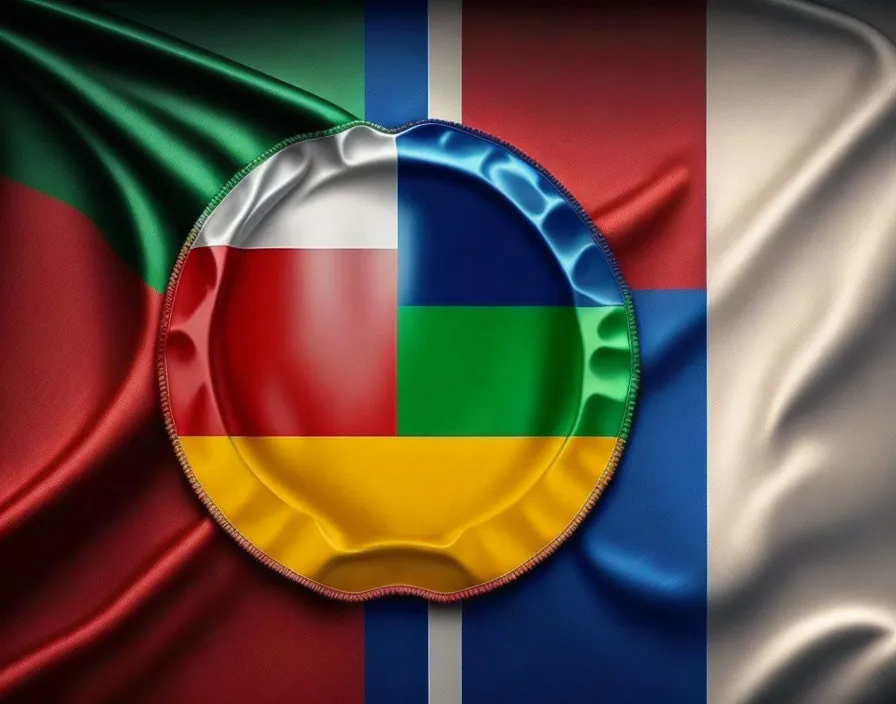Hello, hivers. Here you have the tenth delivery of my #latamreports series, where I review the last trends in Latin America's political and economic landscape. Today we go a little bit longer with our comments around two topics critical to the region: violence and corruption. Let's go ride on it ya.

The Latin American Report | Deep Dream Generator
Violence
One of the critical problems in the region, if you have been following my reports for some time, is insecurity. Gangs and criminal organizations, particularly those oriented to drug trafficking, hold a stranglehold on the citizens of many countries in the region, in a spiral of violence that has no end in sight.
There is a socioeconomic, historical, and political basis behind this phenomenon. Although several countries such as El Salvador and Mexico have proposed strategies to combat this scourge, the results are still very tenuous, as we don't see a comprehensive approach to managing the problem. It also happens that the alliances between political power and those who are up to their chests in crime are increasingly difficult to undo, because of all the noise that their revelation can generate.
The saddest and most worrying thing is how women are contributing more and more victims every day, in what are explicit acts of femicide. And if we talk about how this becomes routine news, it is for the earth to weep. In my last report, I referred to young Mexican women murdered and incinerated, one of them 19 years old. Yesterday, Sunday, another event involving females occurred in Honduras, so it's non-stop events of this type. What are we doing? Or rather, what are we not doing as a society?

Image by Steve Buissinne from Pixabay
Femicide in Honduras
We have before us the news of two women and a child of only eight months, belonging to the same family (they were mother, daughter, and grandson), who were shot to death by men who attacked them in their own home, in the department of Olancho in eastern of the country. We're talking about one of the most violent countries in the world (an average of 10 to 13 murders per day), where so far in 2023 the number of women who have died as a result of acts of violence exceeds 80. According to EFE, the Honduran government generally links violence to organized crime, drug trafficking, and gangs known as "maras". The power of those subjugating citizens and politicians is easily explained by the fact that they are said to control several cities in Honduras.
Criminal organizations against the people
Also yesterday, Sunday, in Michoacán, Mexico, a dozen human remains were found by farmers walking through a wooded area in the town of Zirimícuaro, in two clandestine graves. With the help of specialized dogs (we have already reviewed the support of these canine law enforcement agents in the battle against drugs, now in the location of abandoned human lives), the forensic experts monitored the terrain and were able to exhume these ten human bones, with alleged signs of bullet impacts or violence. In principle, there is talk that hired killers from the drug trafficking market may have killed the victims.
Corruption
Another issue that takes Latin America in a hurry is corruption. I started this report yesterday and already had two notes to share with you, and today I added two other ones. We have cases in Venezuela, the Dominican Republic, Guatemala, and the Commonwealth of Puerto Rico, the first being the highest profile.
But let's remember that we have active alerts on this issue in countries like Ecuador and that the recent drift of the socio-political state in Peru has to do with corruption, although according to a colleague who lived there for years, this problem has an important historical connotation. So let's see what has passed in the last hours.

Image by Steve Buissinne from Pixabay
Tareck resigns
Tareck El Aissami, the Venezuelan oil minister, a historic figure in the ranks of the movement led by the late Hugo Chávez, resigned today to say his as a show of support for an anti-corruption operation involving PDVSA, the state-owned oil company. It involves tracing around US$ 3 billion connected to payments for crude oil in crypto assets in 2022, according to press reports. The Venezuelan government has long been pushing cryptocurrencies as an alternative to the sanctions imposed by several countries led by the United States, so we'll see how this effort could have been diverted to serve malicious intentions.
Arrested officials such as Colonel Antonio Pérez Suárez, PDVSA's vice president of Commerce and Quality Supply, and Joselit Ramírez —who allegedly diverted the funds—, superintendent of Crypto Assets from Venezuela (SUNACRIP in Spanish, which manages oil industry funds through cryptocurrencies), are related to El Aissami. Also linked to him is Hugbel Roa, the intellectual father of the Petro, the state cryptocurrency backed by the country's crude oil reserve —the largest in the world—. This is starting now, so we are activating an alert to monitor this case, somehow crypto-versed, as more details become known.
A sold nation
So far 19 collaborators of former Dominican Republic President Danilo Medina, including three former ministers linked to a millionaire embezzlement and money laundering scheme, have been arrested during a "complex" anti-corruption operation, judicial authorities said yesterday.
The most conspicuous defendants are Donald Guerrero, former Minister of Finance; José Ramón Peralta, former Administrative Minister of the Presidency; Gonzalo Castillo, former Minister of Public Works; Daniel Omar Caamaño, former Comptroller General of the Republic; and Oscar Chalas Guerrero and Julián Omar Fernández, former directors of Casinos and Gaming. If we look at the social areas they administered, we realize how sold out the Dominican nation was under Medina's two terms in office between 2012 and 2020. It's truly incredible how much the cancer of corruption metastasized there.
Health services compromised in Guatemala
Gerardo Hernández, Guatemala's former vice-minister of Health, finally surrendered to the country justice today, from which he had been a fugitive since March 15 after being accused of another millionaire state embezzlement linked to the health sector. The Public Prosecutor's Office (MP) accuses Hernández of approving an anomalous purchase of 67 million quetzals (US$ 8,5 million) which was originally intended to equip a national hospital, inaugurated in February, in the province of Chimaltenango, located 60 kilometers from the Guatemalan capital.
Corruption in PR
Luis Irizarry Pabón, mayor of Ponce (in southern Puerto Rico), will be investigated for allegedly having demanded money from his trusted employees to pay a personal loan to partially defray his political campaign, contrary to the corresponding regulations. Sadly, this is not the only offense he is accused of, you can read more about it here. Puerto Rico is a territory in the region that also has a string of corruption scandals in public administration, which at times has triggered strong social protests, with the involvement and sometimes active leadership of artists and intellectuals.
Quicks
- Luiz Inácio Lula da Silva reactivated on Monday the "More Doctors" program, a successful health project that provided medical care for the first time to people and remote places in Brazil, and which his predecessor Jair Bolsonaro torpedoed by appealing to conservative rhetoric related to Cuba, whose doctors were part of the professional base that supported the project at its inception. This new edition seeks to more than double the number of professionals attending the Unified Health System (SUS) posts located in favelas, peripheries of large cities, isolated municipalities in the Amazon, small municipalities in the interior, and indigenous villages.
- Colombia's Ombudsman said Monday that the end of the bilateral ceasefire with the "Clan del Golfo" —the largest criminal gang active in Colombia— announced Sunday by the government of Gustavo Petro, is a sort of ultimatum for the other three groups with which the Executive agreed to this measure to show real gestures of peace. The aforementioned organization is being singled out for a recent attack on security personnel, and also for supporting a mining strike that has the authorities in the states of Antioquia and Cordoba in check.
Finance
Regional markets closed Monday with a positive balance, helped by the global decline of the dollar. The USD index against a basket of six currencies fell by 0.453%. The Brazilian real outperformed by 0.54%, while the Bovespa index of the Sao Paulo B3 stock exchange fell by 1.04%. Reuters refers to Lula da Silva's intention to announce a new financial framework before traveling to China next Saturday as a reason for this latest data.
The Argentine peso declined 0.57% in central bank-regulated depreciation, while the Merval stock index, which had experienced positive dynamics at the opening of the week, ended -0.31%, after accumulating an aggregate decline of 6.21% in the previous week. The Chilean peso climbed 0.86%, being accompanied in this positive trend by the IPSA, the leading index of the Santiago Stock Exchange (+1.14%). The Peruvian sol fell by 0.45%, and the benchmark index of the Lima Stock Exchange advanced by 0.48%. Financial activity in Mexico and Colombia was paused due to local free labor days.
This is all for our tenth report. I have referenced the sources dynamically in the text, and remember you can learn how and where to follow the LATAM trail news by reading my work here. Have a nice day.
